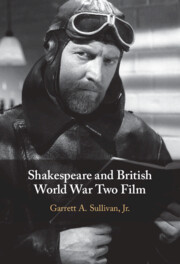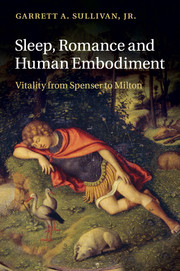41 results
Chapter 1 - “Hamlet’s a Loser, Leslie”
-
- Book:
- Shakespeare and British World War Two Film
- Published online:
- 24 March 2022
- Print publication:
- 31 March 2022, pp 26-57
-
- Chapter
- Export citation
Contents
-
- Book:
- Shakespeare and British World War Two Film
- Published online:
- 24 March 2022
- Print publication:
- 31 March 2022, pp vii-vii
-
- Chapter
- Export citation
Dedication
-
- Book:
- Shakespeare and British World War Two Film
- Published online:
- 24 March 2022
- Print publication:
- 31 March 2022, pp v-vi
-
- Chapter
- Export citation
Coda - Two Cities Films and “the Spirit of Britain”
-
- Book:
- Shakespeare and British World War Two Film
- Published online:
- 24 March 2022
- Print publication:
- 31 March 2022, pp 171-195
-
- Chapter
- Export citation
Chapter 4 - “Bottom’s Not a Gangster!”
-
- Book:
- Shakespeare and British World War Two Film
- Published online:
- 24 March 2022
- Print publication:
- 31 March 2022, pp 136-170
-
- Chapter
- Export citation
Index
-
- Book:
- Shakespeare and British World War Two Film
- Published online:
- 24 March 2022
- Print publication:
- 31 March 2022, pp 196-204
-
- Chapter
- Export citation
Chapter 3 - The Black-White Gentleman
-
- Book:
- Shakespeare and British World War Two Film
- Published online:
- 24 March 2022
- Print publication:
- 31 March 2022, pp 96-135
-
- Chapter
- Export citation
Figures
-
- Book:
- Shakespeare and British World War Two Film
- Published online:
- 24 March 2022
- Print publication:
- 31 March 2022, pp viii-ix
-
- Chapter
- Export citation
Copyright page
-
- Book:
- Shakespeare and British World War Two Film
- Published online:
- 24 March 2022
- Print publication:
- 31 March 2022, pp iv-iv
-
- Chapter
- Export citation
Acknowledgments
-
- Book:
- Shakespeare and British World War Two Film
- Published online:
- 24 March 2022
- Print publication:
- 31 March 2022, pp x-xii
-
- Chapter
- Export citation
Introduction
-
- Book:
- Shakespeare and British World War Two Film
- Published online:
- 24 March 2022
- Print publication:
- 31 March 2022, pp 1-25
-
- Chapter
- Export citation
Chapter 2 - “What We All Have in Common”
-
- Book:
- Shakespeare and British World War Two Film
- Published online:
- 24 March 2022
- Print publication:
- 31 March 2022, pp 58-95
-
- Chapter
- Export citation

Shakespeare and British World War Two Film
-
- Published online:
- 24 March 2022
- Print publication:
- 31 March 2022
12 - Shakespeare and World War II
-
-
- Book:
- The Cambridge Companion to Shakespeare and War
- Published online:
- 17 August 2021
- Print publication:
- 14 October 2021, pp 205-220
-
- Chapter
- Export citation
Sleep in Early Modern England. Sasha Handley. New Haven: Yale University Press, 2016. xii + 280 pp. $65.
-
- Journal:
- Renaissance Quarterly / Volume 70 / Issue 3 / Fall 2017
- Published online by Cambridge University Press:
- 20 November 2018, pp. 1128-1129
- Print publication:
- Fall 2017
-
- Article
- Export citation
Index
-
- Book:
- Sleep, Romance and Human Embodiment
- Published online:
- 05 September 2012
- Print publication:
- 09 August 2012, pp 201-206
-
- Chapter
- Export citation
Part III - Aristotelian vitality undead
-
- Book:
- Sleep, Romance and Human Embodiment
- Published online:
- 05 September 2012
- Print publication:
- 09 August 2012, pp 131-150
-
- Chapter
- Export citation
Notes
-
- Book:
- Sleep, Romance and Human Embodiment
- Published online:
- 05 September 2012
- Print publication:
- 09 August 2012, pp 151-200
-
- Chapter
- Export citation
Contents
-
- Book:
- Sleep, Romance and Human Embodiment
- Published online:
- 05 September 2012
- Print publication:
- 09 August 2012, pp vii-vii
-
- Chapter
- Export citation

Sleep, Romance and Human Embodiment
- Vitality from Spenser to Milton
-
- Published online:
- 05 September 2012
- Print publication:
- 09 August 2012

